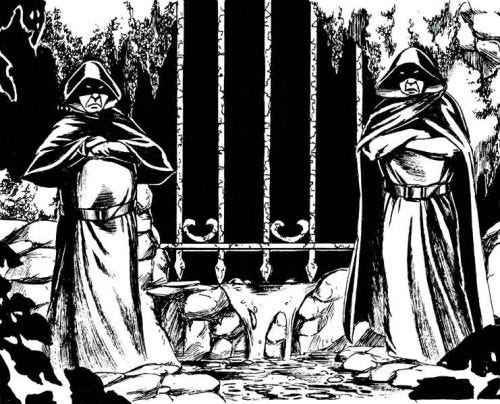The OSR is a Pearl
And it does not belong to you
Tabletop gaming is great. It’s one of my most cherished hobbies, and I spend a lot of time participating in it through play, preparation, or writing like this. I find a lot of elegance in its ways, particularly the ways of the games I play. As I participate, my goals are not to topple or usurp but to enhance and fortify. Although my success in keeping to those promises are subject to opinion, I would say I am a good steward of the OSR and its principles. There are many like me, likely you who are reading this, who are also good stewards of the hobby. Today, I aim to philosophize what it means to be a steward and the duties accompanying that title.
To Steward
Merriam-Webster defines a steward as “[some]one employed in a large household or estate to manage domestic concerns (such as the supervision of servants, collection of rents, and keeping of accounts)”. The key words are “manage” and “supervision”. See, the OSR isn’t yours, nor mine, nor really anyone’s. We stand on the shoulders of giants who left us fertile fields to continue sowing and reaping fruits of good old roleplaying ambrosia. Some of these giants still live yet, but even they cannot claim ownership, having already invited others into it. The OSR just is, but it cannot maintain itself. Like wild animals rely on each other to be well-groomed, the OSR needs to be groomed and kept in good working order.
Just as those before us, indeed definitely before me, we too will one day be removed from this life. We, who have been stewards of the OSR, have the unique opportunity and responsibility for choosing who will succeed us and become stewards themselves of the OSR and its legacy. In the same way you would want a well-intentioned inheritor of your real estate, you should as well exercise discretion when choosing the inheritors of your hobbies; of course, the gravity of those two objects are incomparable, but the principle applies equally.
The danger presented to the OSR by the widespread accessibility of the internet is that those who have no interest in preserving the spirit of the OSR have unfettered access to its spaces, and they are able to influence its stewards. It is important to weigh the words of strangers against the principles of the hobby, its foundational works, and the historical application and impact of both.
On “Gatekeeping”
The simple truth is, for any interest that exists, there have always been, and will always be, an opposition whose only objective with regard to that interest is to rend it and leave it defiled. In many cases, these individuals are self-identifying, being repulsive to those who have an earnest stake in the hobby and openly denouncing all it stands for. Case in point, many players of non-OSR systems balk at the notion of not having skills for everything and voice their disapproval obstinately. Still, there are others who seem receptive to what the hobby is about and what the OSR stands for but ultimately leave those thoughts behind as if the conversation never happened. Neither of these types of people would I call fundamentally malicious, and regarding them in that sole fashion would likely only lead to paranoia.
The admonition “cast not your pearls before swine” applies here. Intention notwithstanding, these types of people are all, metaphorically, swine. The OSR here is our pearl, and we are its guardians. We are all too aware of its qualities and why we enjoy it, but it is a waste of time to continuously present it to those who have no intention of doing the same. There is nothing lost from excluding these people from play or invitation to play or conversation, because they will exclude themselves anyway often while picking apart everything you say to turn back against you.
Our time is much better spent preparing others to take over our stewardship. Newcomers to the hobby need strong role models and foundational support, while those who are well-principled in the OSR have a duty to become these cornerstones of the hobby. Although I mention the concept of legacy and passing on, I don’t believe achieving a higher age confers accolades on its own. The grognards generally have a more accurate depiction of what OSR is, but not all oldies are grognards; similarly, there are plenty of us green in years that have a solid grasp of how to do old school play.
In this way, it is a form of gatekeeping that does not discriminate on the basis of any class of being besides holding genuine interest in the hobby. Although the word “gatekeeping” is looked at negatively, I believe that is a misguided paradigm. Gatekeeping doesn’t prevent anyone from participating in the hobby; but it filters the influence of outsiders from those within. This is the same as referring to a structural engineer before taking advice on improving the foundation of your home, and it is necessary for maintaining the principles of the OSR.
Anyway, these thoughts occurred to me after hearing recently that phrase about pearls and swine in a song, Pearls (Before the Swine) by Damion Suomi & the Minor Prophets. I understand these may be unpopular opinions, not to mention disorganized or haphazardly written. I don’t consider anything before writing other than “can I write more than three paragraphs on this topic, and is it relevant to old school tabletop gaming?”. Let me know what you think.








He's out of line, but he's right! I was recently called a "gate keeper" because I have said the OSR isn't for everyone. I think I'll embrace the title. Keep the gate lads and lasses, hold fast!